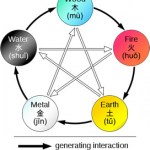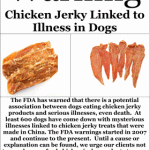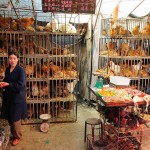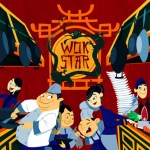china
Of all the forms of unproven and disproven alternative medicine being enthusiastically "integrated" into science-based medicine by proponents of "integrative medicine" (formerly—and sometimes still—known as "complementary and alternative medicine," or CAM), so-called "traditional Chinese medicine" (TCM) is clearly among the most popular and seemingly the most accepted. After all, acupuncture, the most famous modality in the TCM armamentarium, is offered in dozens of academic medical centers and hundreds of medical centers in the US, but it goes beyond that. It doesn't matter that the totality…
At the Detroit Free Press, Jennifer Dixon and Kristi Tanner investigate Michigan’s workplace safety and oversight system and talk to the families of victims who say there’s no justice for workers who’ve been injured or killed on the job. During the year-long investigation, the reporters looked into more than 400 workplace deaths across the state, finding “a flawed system of oversight with penalties against employers so low they're not a deterrent.”
The article began with the story of Mary Potter, who worked at a group home for people with developmental disabilities. Dixon and Tanner write:…
At the Center for Public Integrity, reporters Jim Morris and Maryam Jameel investigate the nation’s “third wave” of asbestos-related disease. The story begins with two photos of Kris Penny, who used to install fiber-optic cable beneath the streets of Florida.
The first photo is of Penny in April 2015, looking healthy and happy. The next photo is one taken just six months later. Penny looks dramatically transformed after being diagnosed with peritoneal mesothelioma, a rare cancer of the abdominal lining that’s nearly always related to asbestos exposure. After talking with a lawyer, Penny…
By Peter Gleick (Pacific Institute) and Carl Ganter (Circle of Blue)
1. The California Drought Becomes an Emergency
California’s multi-year drought grew dire enough in 2014 to prompt Governor Jerry Brown to declare a drought emergency in January. By the end of the year, California had experienced the driest and hottest 36 months in its 119-year instrumental record. Some researchers described the drought as 1) the worst in over 1200 years and 2) evidence of rising temperatures globally as climate changes accelerate. As of mid-January, the drought is continuing.
As the California and…
I've written quite a few times, both here and elsewhere, about the sham that is known as "traditional Chinese medicine" (TCM). Basically, there is no such thing as TCM per se. There were in the distant past many "traditional Chinese medicines," various folk medicine traditions that, contrary to what is taught now, did not form a cohesive system of medicine that worked. Then, in the 1940s and 1950s, Chairman Mao Zedong, unable to provide "Western" science-based medicine to all of his people, popularized Chinese folk medicine as "traditional Chinese medicine" and exported it to the world…
I used Google N-gram Viewer to inspect the occurrence of the word "Ebola" in the Google-indexed literature. A few instances of Ebola came up earlier than the disease being known, so I figured they were references to the place name in Zaire/Congo, after which the disease is named. And that was in fact the case. But, of handful of early instances I checked out, two were interesting.
The Ngram is above. Note that I have smoothing set to zero, which I recommend, and I've got the date set for early on in the use of the term so pre-disease uses are more visible.
The two interesting instances I…
FDA is looking for your help to determine source of illnesses and deaths related to dog jerky treats
Image from Vin News Service (http://news.vin.com/VINNews.aspx?articleId=22697)
The FDA is calling for help to determine the source of roughly 580 deaths and over 3600 illnesses (gastrointestinal and kidney) related to jerky treats that were made in China. The mystery dates back to 2007 when illnesses were first being reported by pet owners. Most of the victims have been dogs, although 10 cats have become sick from eating these treats as well.The FDA has tested treats for contaminants including chemical, microbiological/bacterial, antibiotics, metals, and pesticides in addition…
Student guest post by Julia Wiederholt
I don’t think there is a single person that can claim to have never had the joyous experience (sarcasm intended) of suffering from the influenza. We all recognize the common symptoms that accompany this infectious little virus taking up residence in our bodies: the chills accompanying a fever, the total body ache, the nausea, and overall feeling of malaise. Typically this virus comes and goes within a week without serious side effects. When novel strains of the influenza pop up however, there can be more serious complications as your…
A new strain of bird flu is circulating in China, and authorities are keeping a close eye on a potentially disastrous scenario. On Aetiology, Tara C. Smith writes that by now, "the microbe may have already become established in the population, adapting to humans stealthily before we were even aware of it." Greg Laden writes, unlike H1N1 in 2009, the new H7N9 doesn't sicken birds, making it more difficult to identify reservoirs of the virus. And according to the latest reports, it doesn't make all people sick either. Documented infections are widespread in a populous…
I have a new article up today at Slate, examining the emergent H7N9 avian influenzas, and a bit of a review of "bird flu" in general:
While we were carefully watching H5N1 in Asia and Europe, another influenza virus—2009 H1N1—appeared seemingly out of nowhere. Ultimately traced back to swine, this virus was easily spread between people, but unlike H5N1, it wasn’t any more deadly than our normal yearly influenza viruses (which, it should be noted, still kill on the order of 36,000 Americans each year). And now, while we’re still working on understanding how H5N1 and H1N1 have jumped between…
Some thoughts for today: the bad news and good news for World Water Day. [First, I think every day should be World Water Day, not just March 22nd, but hey, that’s just me.]
Stop taking your tap water for granted. Go to your tap, draw a glass of water, and drink it. Then remember that nearly a billion people still do not have reliable access to safe, affordable tap water and cannot do what you've just done.
Stop taking your toilet for granted. Nearly 2.5 billion people (more people than lived on the planet in the 1930s) don’t have safe sanitation.
Do you know anyone who had cholera…
The Chinese Twitter equivalent Weibo censors searches for the names of places where there are protests (currently Shenzhen). You could write a script that searches for the main Chinese cities on Weibo and plots the ones that are censored on a map. Presto, a dynamic map of Chinese political unrest! With data supplied by the Chinese government, no less. Who will do it first?
Update same day: Daniel Becking points to the highly informative web site Blocked On Weibo. It has a wide remit. The most recent entry explains why the two characters for "pantyhose" are blocked.
Fazer's old packaging
Fazer has removed the cartoon East Asian from one of two versions of the packaging for their chocolate-covered puffed rice. Only the conical straw hat remains, an "abbreviated motif" as Karl Hauck would have put it. Tørsleff still has the guy on their gel agent. Gabob recently published the fine boardgame Wok Star which is full of cartoon East Asians.
Tørsleff's gel agent
Thinking about these images, I've decided that I don't find them racist. The old Fazer and Tørsleff cartoons are certainly outdated, since few people in East Asia wear conical straw hats or queue…
I had a brief but interesting conversation with a distinguished Chinese art historian the other day. He's my age but has been far more successful than me despite relocating to Sweden. We were talking about science and superstition, because apparently someone had described the Swedish Skeptics that I head to him as “The Swedish Anti-Superstition Society”. Anyway, he told me this (and I paraphrase).
“I'm not sure China is going the right way now with its emphasis on Western science, technology and capitalism. Just look at the environmental degradation and rapid urbanisation. If my country hadn'…
This is one of the hazards of being an archaeologist (it has happened to me a few times) but it is sad to see it occur with a private citizen.
The moral of the story? Don't be talking on your cell phone when instead, you should be scanning the terrain in front of you with Ground Penetrating Radar to locate cavities that are too close to the surface.
A rock burst at a coal mine in China's Henan province has killed a total of 10 miners. The explosion happened just after a minor 2.9-magnitude earthquake occurred nearby, and 45 workers were rescued after 36 hours underground - although two of those workers later died of their injuries.
Last month, a gas explosion at a coal mine in Hunan provice killed 29 miners, while six survived. (29 was also the death toll from the 2010 Upper Big Branch disaster in West Virginia.) CCTV reported that the mine had lost its operating license earlier this year after failing to ventilate sufficiently, but…
Bicycling has been in the news a lot this week. E&E News reports that China is trying to get people back onto bicycles in an attempt to address traffic problems. The city of Zhongshan has launched a bike-sharing system with 4,000 bikes; Hangzhou and Shanghai have systems with 50,000 and 19,000 bikes, respectively. Reporter Coco Liu contrasts these figures to the US's largest bike-sharing program: DC's, with 1,100 bikes. (Read my earlier post on Capital Bikeshare here.) Even with such relatively large systems, though, demand can quickly outstrip supply, as when a train full of homeward-…
My wife just returned from Beijing where she's been collecting interviews for a TV project. And I find that her beauty is not luxurious imagination.
My wife's from Zhejiang province, and so is this can of pickled cabbage that she bought yesterday. I like the label a lot. It's not quite Engrish: of course, we would say "people's mess hall", but the Chinese characters actually denote an extremely basic canteen-like eatery. A mess hall, a canteen, maybe a refectory; very latter-day Maoist. It's a correct translation.
I endorse the pickled cabbage of the Chun'an Qiandaohu Nongxing Food Co., Ltd.. It is by far good enough to be served not only in mess halls.
While "flesh-eating infections" caused by the group A streptococcus (Streptococcus pyogenes) may grab more headlines today, one hundred and fifty years ago, the best known and most dreaded form of streptococcal infection was scarlet fever. Simply hearing the name of this disease, and knowing that it was present in the community, was enough to strike fear into the hearts of those living in Victorian-era United States and Europe. This disease, even when not deadly, caused large amounts of suffering to those infected. In the worst cases, all of a family's children were killed in a matter of a…






